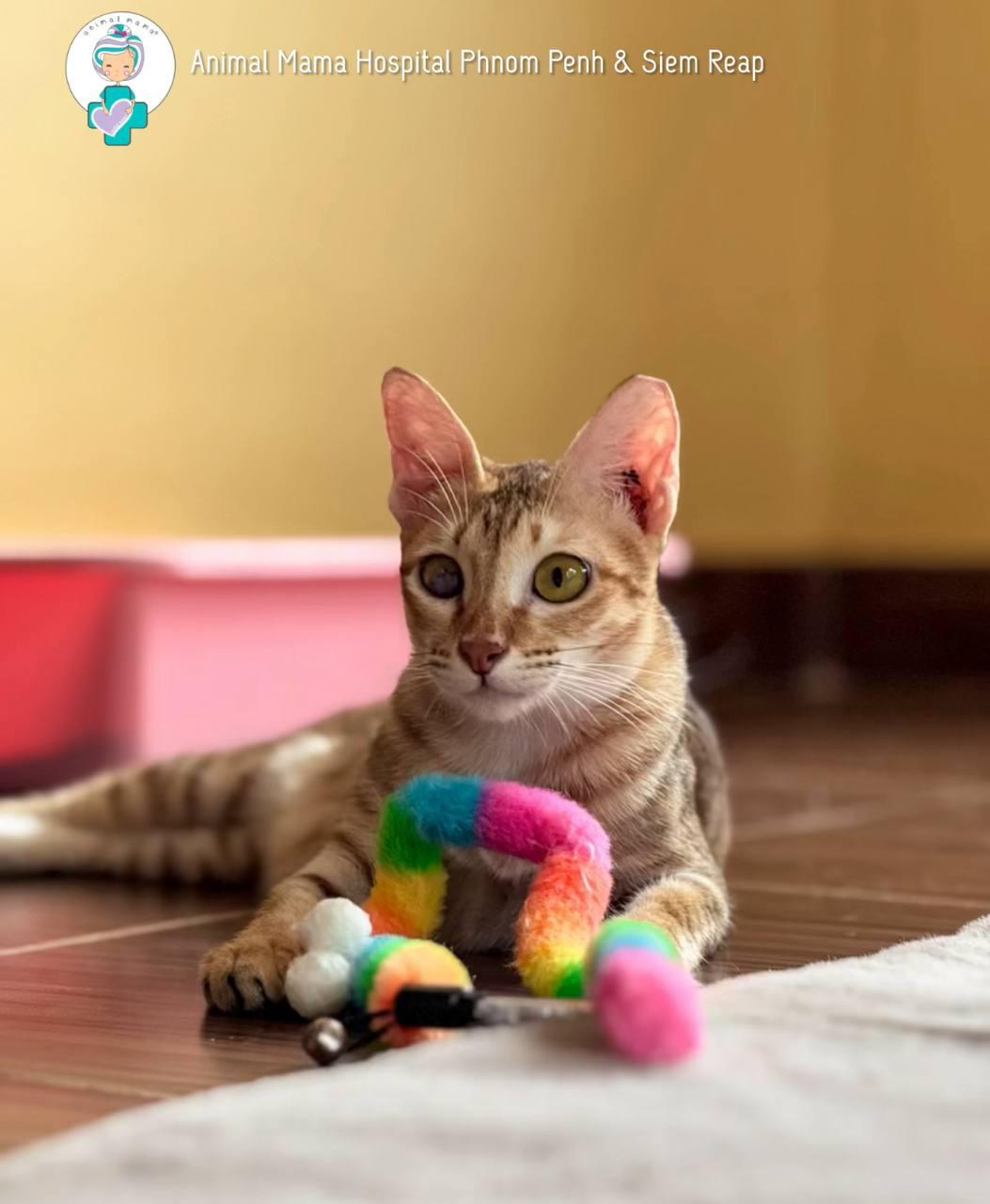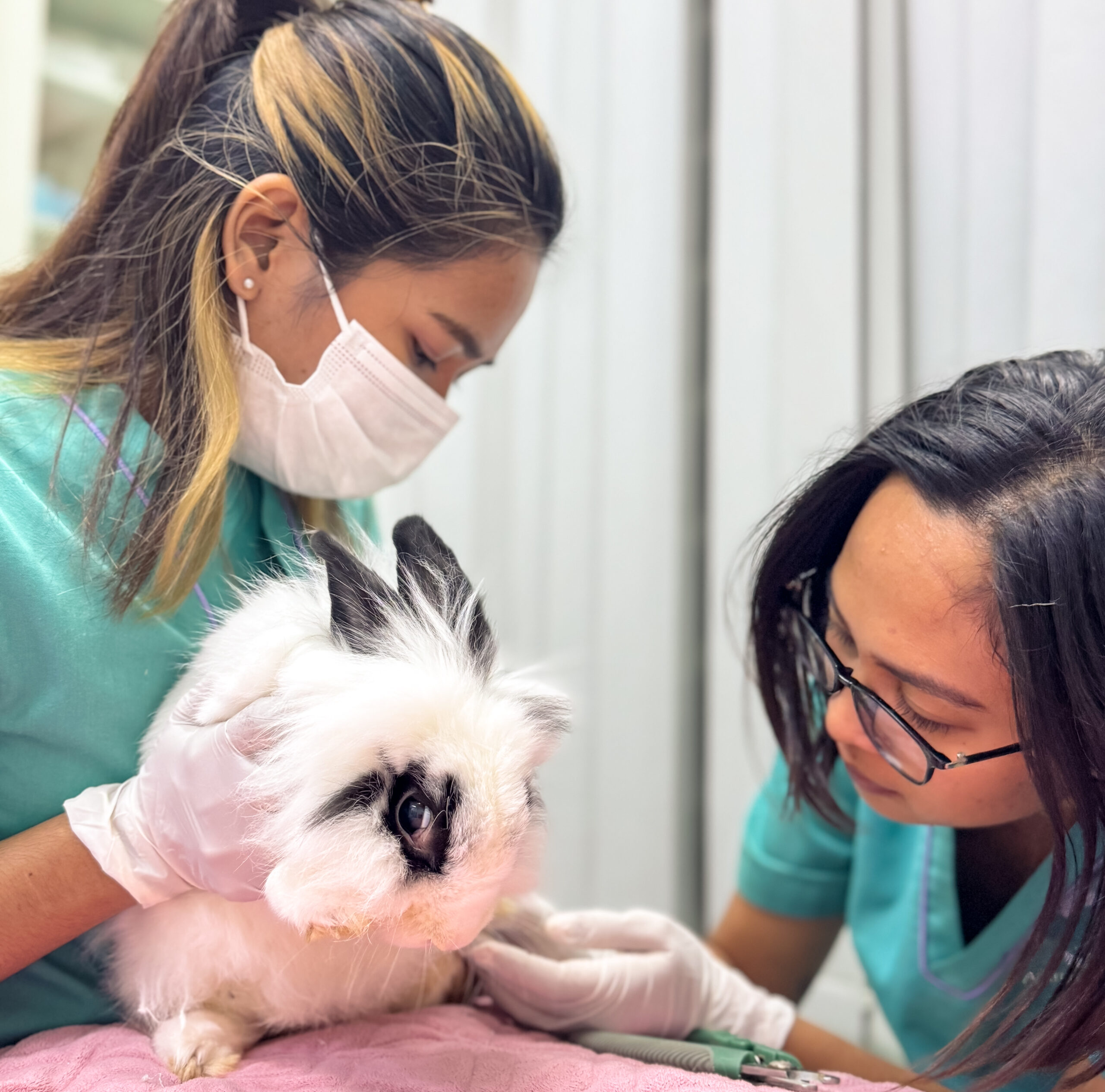FAQ
Do you have any questiones about your pets health or specific procedure in our clinic?
Rabies is a viral disease that affects the central nervous system of mammals, including humans and pets. It is usually transmitted through the bite of a rabid animal. The virus is fatal once symptoms appear, making prevention through vaccination extremely important.
Rabies is most commonly transmitted through the saliva of an infected animal, typically via bites. It can also be transmitted when infected saliva comes into contact with open cuts or mucous membranes (eyes, nose, mouth). Wild animals like bats, raccoons, skunks, and foxes are common carriers.
Initial symptoms may include fever, chewing at the bite site, and behavioral changes. As the disease progresses, pets may show signs of aggression, excessive drooling, difficulty swallowing, seizures, paralysis, and eventually death. Any sudden behavior change in your pet should prompt an immediate visit to the vet.
Rabies vaccination is crucial because:
- It's the only way to prevent rabies, a fatal disease once symptoms develop.
- It's required by law in many places due to the public health risk posed by rabies.
- Vaccinating pets protects them, their owners, and the community by preventing the spread of the disease.
Puppies and kittens should receive their first rabies vaccination at around 3-4 months of age, with a booster shot a year later. After this, pets should be vaccinated every 1-3 years, depending on the type of vaccine used and local laws. Consult with your veterinarian for the recommended vaccination schedule for your pet.
The rabies vaccine is safe for most animals. Some pets may experience mild side effects, such as soreness at the injection site, fever, or lethargy, which typically resolve within a few days. Severe reactions are rare. Discuss any concerns with your veterinarian, especially if your pet has had reactions to vaccines in the past.
If you suspect your pet has been bitten by a rabid animal or exposed to rabies, contact your veterinarian immediately, even if your pet is vaccinated. Prompt medical assessment and possible booster vaccinations may be necessary. In areas with high rabies risk, it's crucial to report the incident to local animal control or public health departments as well.
If you are bitten by an animal, it's crucial to take the following steps to reduce your risk of rabies and other infections:
Clean the Wound: Immediately wash the wound thoroughly with soap and water for at least 15 minutes to help remove the rabies virus if present.
Seek Medical Attention: Visit a healthcare provider or an emergency room promptly. Medical assessment is essential to evaluate the need for rabies post-exposure prophylaxis (PEP), which includes a series of rabies vaccinations.
Initiate Post-Exposure Prophylaxis (PEP): If the risk of rabies is determined to be significant, PEP should be started as soon as possible. PEP is nearly 100% effective in preventing rabies when administered correctly and promptly. It typically involves one dose of rabies immunoglobulin and four doses of rabies vaccine over a two-week period for an unvaccinated person.
Report the Bite: Inform local health authorities or animal control about the bite. They can help in monitoring or testing the animal for rabies, which is crucial for determining the need for continued PEP.
- Follow Up: Adhere to any medical advice and complete the full course of treatment. Keep the wound clean and monitor for signs of infection or illness.
By taking these steps immediately after an animal bite, you significantly reduce the risk of developing rabies and ensure proper management of potential health complications. In case of the bite contact the local Vaccination center at Pasteur Institute Cambodia
Anesthesia is generally safe for most pets. We conduct a thorough pre-anesthetic check-up, including blood tests, to ensure your pet is a good candidate for anesthesia. Our veterinary team closely monitors your pet throughout the procedure to maintain safety.
Recovery time varies depending on the type of anesthesia used and the overall health of your pet. Most pets begin to wake up within a few hours after the procedure, but full recovery might take 24 to 48 hours. We'll provide you with specific post-care instructions to ensure a smooth recovery.
While anesthesia is generally safe, some risks are associated with its use, including:
- Allergic Reactions: Although rare, some pets may have an allergic reaction to anesthetic agents.
- Respiratory Issues: Anesthesia can depress the respiratory system, which is why pets are closely monitored to ensure adequate breathing.
- Cardiac Problems: Changes in heart rate and blood pressure can occur, particularly in pets with preexisting conditions.
Recovery Risks: Some pets may experience difficulty waking up from anesthesia, or they may be disoriented and at risk of injury immediately following the procedure.
- We take every precaution to minimize these risks, including pre-surgical evaluations and continuous monitoring during and after anesthesia.
Popular Questions
We recommend a dental check-up at least once a year for most pets. However, some pets may require more frequent check-ups depending on their age, breed, and overall dental health.
Our dental services include teeth cleaning and polishing, dental X-rays, tooth extractions, and minor oral surgeries. We also provide advice on home dental care for your pets.
Popular Questions
Visit our adoption page to view the pets available for adoption. You can fill out an application form online or visit our facility to meet the pets in person. Our team will guide you through the adoption process and help you find the perfect match for your family.
Adopters must be 18 years or older, provide a government-issued ID, and complete an adoption interview. We also require proof of address and, in some cases, permission from your landlord if you rent your home. Our goal is to ensure a good fit for both the pet and the adopting family.
Popular Questions
Requirements vary by destination, but generally, you will need a pet passport, microchip, up-to-date vaccinations, and sometimes a health certificate and specific blood tests. It's important to start the preparation process well in advance of your travel date.
Yes, we offer pet relocation services. Our team can assist you with the paperwork, vaccinations, microchipping, and any other requirements for international travel. We aim to make the relocation process as smooth and stress-free as possible for you and your pet.
Popular Questions
We offer a range of surgical services, including spaying/neutering, dental surgery, tumor removal, orthopedic surgery, and emergency surgeries. Each surgical procedure is tailored to the specific needs of your pet.
You'll receive detailed instructions prior to the surgery date, which typically include fasting your pet for 12 hours before the procedure. Also, ensure your pet is clean and free of external parasites. If your pet is on medication, please inform us in advance.
Popular Questions
Vaccination plays a crucial role in protecting your pet from various contagious and potentially deadly diseases. It also helps in preventing the spread of certain diseases to other animals and, in some cases, to humans. Vaccines stimulate your pet's immune system to prepare defenses against specific diseases.
Core vaccines are considered essential for all pets, regardless of their lifestyle. For dogs, core vaccines typically include rabies, distemper, parvovirus, and adenovirus. For cats, core vaccines include rabies, panleukopenia (feline distemper), feline calicivirus, and feline herpesvirus type I. Your veterinarian may recommend additional non-core vaccines based on your pet's risk factors.
The vaccination schedule varies depending on the type of vaccine, your pet's age, medical history, and lifestyle. Generally, puppies and kittens receive their first vaccines at 6-8 weeks of age, with boosters given at 3-4 week intervals until they are about 16 weeks old. Adult pets require regular booster shots, typically on an annual basis, but some vaccines may have longer intervals. Your vet will provide a tailored vaccination schedule for your pet.
Popular Questions
Blood tests are essential for assessing your pet's health and diagnosing diseases. They provide valuable information about the functioning of organs like the liver and kidneys, the health of the immune system, and the presence of infections or conditions such as diabetes and anemia. Regular blood tests can help catch health issues early, making treatment more effective.
Fecal examinations help vets check for the presence of intestinal parasites such as roundworms, hookworms, and giardia, which can affect your pet's health and are sometimes transmissible to humans. Analyzing stool samples helps ensure that your pet is free from these parasites and identifies the need for deworming treatments.
Urinary examinations are critical for diagnosing diseases affecting the urinary tract, including infections, kidney disease, and diabetes. These tests can detect abnormalities in urine concentration, presence of bacteria, crystals, blood, and inflammatory cells, which are crucial for accurate diagnosis and treatment planning.
Help Center
Navigate the Unknown FAQs as Your Guide
Need More Answers?
Stay informed and save with our Telegram channel! Join now for daily pet tips and exclusive promotions.






